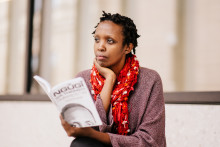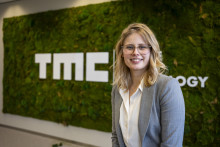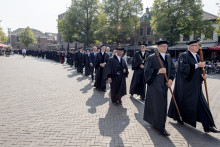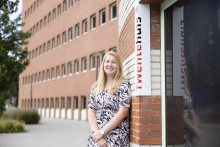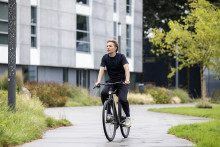Connie Nshemereirwe obtained both her Master and her PhD degree at the University of Twente, where she studied Design of Educational and Training systems and later Educational Measurement. The journey to these diplomas was anything but straightforward, though. Growing up in Uganda, she was ‘lucky enough to receive stable education’, says the alumna. ‘You could say that I come from a middle-class family, but that didn’t mean much back then. There were wars, many people went into exile, the country was not very stable. However, I went to a normal school. I did witness a couple of coups, which meant school was suspended for a week or two while the coup was going on. But since I was twelve years old, there have been no coups and my education became stable.’
Young, female and the boss
The education was certainly good enough to allow Nshemereirwe to study civil engineering at the Makerere University, the only university in the country at the time. ‘I’d say that engineering chose me, I didn’t really choose engineering,’ she remarks. ‘It was considered unusual for girls to be good in math or physics, but I was good in those subjects, partly thanks to my dad who was an engineer. I wanted to study more humanities, but my school wouldn’t allow it.’ Once, young Connie even joined a different class, but the headmistress came in and asked her to leave. So she studied physics, math and chemistry and went on to become a civil engineer. ‘It was okay. I didn’t have a strong preference at the time. After I graduated I worked in a remote area of the country. I liked it. It was the first time I was on my own and I was working in construction, telling people what to do. It was quite challenging. I was young, female and I was the boss. It was not easy for people to accept my authority, but I was competent and so they had to accept me eventually.’
Connie Nshemereirwe
1998 BSc. in Civil Engineering, Makerere University (Uganda)
2004 MSc. in the Design of Educational and Training systems, University of Twente
2014 PhD in Educational Measurement, University of Twente
2001 – 2016 Senior Lecturer, Uganda Martyrs University
2016 – now Independent Science and Policy Facilitator
2018 – now Co-chair of the Global Young Academy
From a construction site to a university
How does a competent engineer from Uganda decide to go study education in the Netherlands? The answer involves a baby and a New Year’s resolution. ‘My friend was teaching at a university, but she unexpectedly had to go on a maternity leave and asked me to take over her classes. I did and I enjoyed teaching so much! When I was on campus, I felt like I was walking on air. But I was only teaching part-time and the rest of the time I had to be in construction, which was getting quite monotonous. University was such a breath of fresh air.’

It didn’t take her long to realize that teaching was her true calling. On New Year’s Eve 2003 she made the decision to quit engineering and become a teacher. ‘I was up all night thinking about what I wanted. When my father saw me in the morning, he was concerned because my eyes were all red. I wasn’t crying, I was just thinking hard. I began looking for a programme where I could learn more about education. Universities in Uganda wouldn’t accept me without a bachelor degree in education and I didn’t want to do another bachelor, so I started looking abroad. I came across Twente. It was perfect. I still remember how excited I was when I found it because it combined education as well as post-education training systems. So on the 1st of January I made up my mind and in August I was already in Enschede. My trip to the Netherlands was actually the first time I was on a plane.’ Her time at the UT came with many ‘firsts’. ‘I remember when I saw my first snow. My roommate was from Zambia and neither of us had ever seen snow before. When it started snowing, we thought something was burning and this was the ash falling down.’
There and back again
After she graduated, Nshemereirwe went back to her home country for six years before returning to the UT. ‘There was quite a big gap between my Master and my PhD. I felt that the Master was quite intense: a lot of learning, a lot of growing as a person, a lot of travelling. When I came back to Uganda I felt so skilled and knowledgeable, I didn’t feel like I needed a PhD. Later on, however, I began to observe these strange patterns in students who I was teaching. It was puzzling. We were receiving students who had really good grades at high school, but they didn’t perform well at the university. They showed shocking gaps in literacy, they were lacking basic skills and background knowledge. So I wanted to research if high school grades in fact predict performance at a university.’ By coincidence, she ran into a UT professor who was involved in her desired line of research and it was time to pack for another trip to Enschede. ‘That was nice. Living in the Netherlands was generally quite easy for me. It felt like a good fit. I come from a tribe in Uganda which is very direct, Dutch people are also very direct. Everyone always knows where the other stands. I was glad to be back.’
'Being an academic was not enough to make a real change in society'
With a PhD diploma in her pocket, the scientist ‘was looking forward to going home and bringing her findings to the university’. She started measuring literacy levels of students, aiming to pinpoint their missing skills and to create programmes to fill the gaps. ‘I found out that each student had problems with something else. The skills were so scattered I would basically have to teach them the entire primary school all over again. That made me realize that university was too late for me to intervene and that to make a real difference, I needed to engage policy makers and contribute to a more systemic change. Just being an academic was not enough to make a real change in society. I resigned from the university to work more on the intersection of policy and research. That was the reason I became self-employed.’

Connie Nshemereirwe is now an independent science and policy facilitator, passionate about promoting science leadership. She currently serves on the steering committee of the Africa Science Leadership Programme, as well as the executive committees of both the Uganda National Young Academy and the Global Young Academy (GYA), an international society of young scientists. This allows her to share her message all over the world. ‘I applied to the GYA because I became very interested in merging the two worlds: of society and science. My personal mission is to show scientists that it’s important to communicate their work with the public, that it gives them influence. If you ignore this possibility, you give the influence to politicians, singers, actors… Scientists are held in high esteem, but people don’t know what we do. We are these mysterious beings in lab coats. I want to show scientists that it’s important to take up their leadership role.’
'Scientists are held in high esteem, but people don’t know what we do'
Uphill battle
Although Nshemereirwe doesn’t have time for her own empirical research at the moment, she plans to pick it up again next year. ‘Co-chairing the GYA takes up most of my time, but my role there ends in June 2020. After that, I want to continue studying the educational gaps in students. We see what is missing but we don’t see why yet.’ She knows that continuing her research will come with challenges. ‘In Uganda, you need to persevere a lot to be a researcher,’ she says. ‘In the Netherlands there is much better access to experienced researchers, but not here. I was looking for people specializing in my field and I could only find two women in the entire Uganda who focused on what I do. It’s an uphill battle. You need to attract your own money and there is not a good access to papers. When I was writing a paper, I couldn’t see all the other papers written on the topic because they were behind a paywall, so I missed a lot. Life of a researcher is not easy here.’
The UT alumna has every intention to persevere. Her plan is simple: she wants to serve her community the best she can. ‘I hope to contribute to our consciousness as Africans in general and as African scientists in particular. I want to stress the importance of engaging with society. As scientists, we are too divorced from our societies. We fail to harness the intelligence and skills of the people. That makes our science poorer. I want to increase our awareness and engagement with the world. But if it comes to a real plan for the future, I have given up on having a plan. I take life as it comes.’



